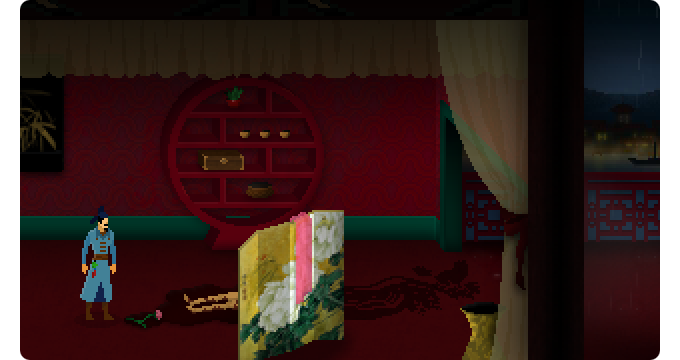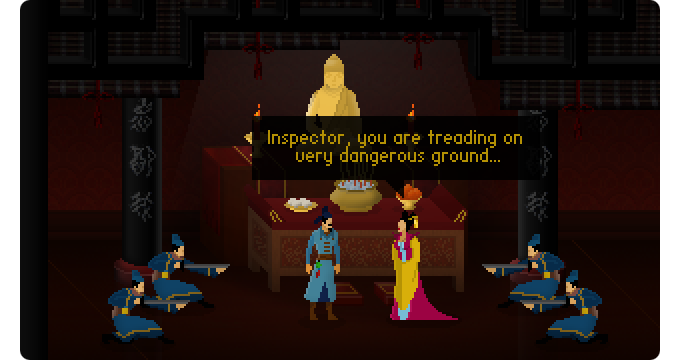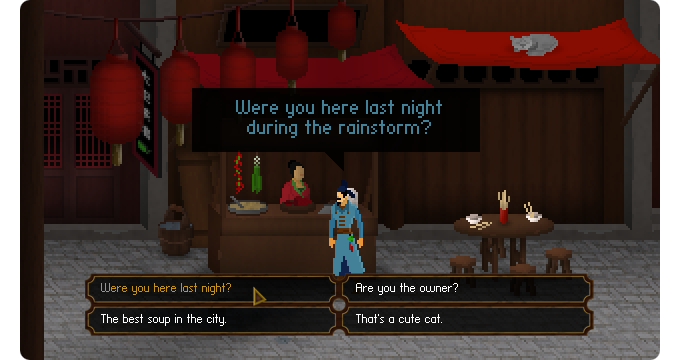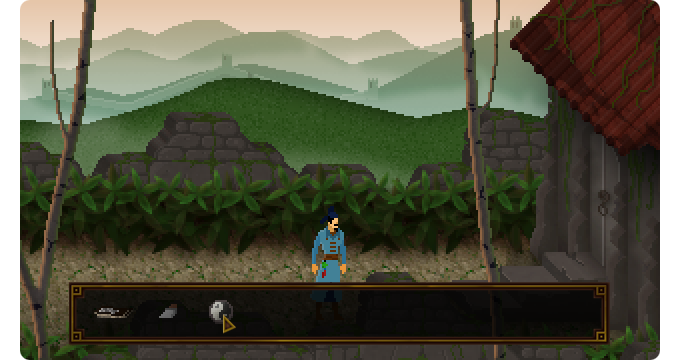Kicking It With Minh Ta
Exploring China with Detective Di (and...solving the occasional murder)

We're in a time where the mystery genre in popular culture is full of Sherlock Holmeses. There are two different television series, each with their own Sherlock. There is a movie (soon to be trilogy) featuring another Sherlock Holmes. There have been four video games in the last five years where the player plays the famous detective. And, of course, there are the countless characters that are based on the popular character.
I'm not complaining. I'm as big a fan of Sherlock Holmes as anyone, but even the biggest fan has to admit that right now, the mystery market is a bit saturated with our friend from Baker Street.
That is where the Kickstarter campaign for "Detective Di: The Silk Rose Murders" caught my eye.
"Detective Di" is a game that will bring Di Renjie to the world of video games. Di Renjie is....well, essentially China's Sherlock Holmes - especially in Chinese popular culture. Unlike Sherlock, however, Di Renjie is a real historical figure. He lived during the Tang Dynasty and rose to prominent status during the reign of Empress Wu Zetian (the only recorded woman to rule China in her own right). Di Renjie was, historically, a popular judge of the highest moral fiber. His popularity over the centuries turned the man into a myth of sorts, and fictional books began to be written of him, which portrayed him as an investigator.
And so enters the game "Detective Di."

"Detective Di: The Silk Rose Murders" is a point-and-click adventure game inspired by old classics of the genre like "Grim Fandango" and "Gabriel Knight" - complete with a beautiful, throwback pixel art-style. The game puts the player in control of a young Di Renjie, a rising magistrate on the trail of a serial killer.
Player Theory had the chance to sit down with Minh Ta, the lead designer, writer and artist behind "Detective Di" and talk about the game.
PT: It's obvious that you guys care a lot about getting the historical setting for this game just right. That said, how much of the game is based on real, historical events and how much comes from the story that you have constructed? Did you do a lot of research before starting development?
MT: As with many centuries-old historical figures, there is no definitive "version" of Detective Di. This gives us a bit of leeway in terms of how we choose to interpret the character. But of course, we also have to be aware of the expectations that exist. For us, the focus will be to setup a world that's seeped in historical detail, like the fact that the Empire was on the brink of civil war, and use that as a backdrop for the main investigation--which ultimately centers around a series of grisly murders.
Player Theory: To start things off, how has your experience with Kickstarter been so far? Are you getting a lot of good interaction from the community? Have you worked on a Kickstarter project before?
Minh Ta: This is my first Kickstarter. Honestly, at first, I was a bit nervous about it, because you kind of put yourself out there for everybody to see. But now that we've passed the halfway mark, what I can say, with a heart filled with gratitude, is that the community has been great. The discussions we've been able to have, the constructive feedback, and of course the generosity, it's all been amazing. It makes us want to work even harder.

PT: I love the gameplay pictures you are showing off on your Kickstarter page. The characters really pull me back to those old-school classic point-and-click adventure games and the settings/backgrounds just look amazing. Who is behind the art in "Detective Di" and what is their background? How did they approach the art direction for "Detective Di?"
MT: Thanks for the compliment! We have a few contributors in the art department. First, Ricardo Rodrigues has done an amazing job with his concept work and the current cover art. We also have artist/animator Josh Cunningham lending a hand. But mostly, I'm responsible for the majority of the in-game art. My approach with the graphics has been mainly focused on serving the setting and story. I knew I had a very distinct world to explore visually, and I wanted to take advantage of everything I could. Tang Dynasty China was very rich and vibrant, and I've tried to project that as much as possible.
PT: Nupixo Games already has a pretty solid history of making free webgames. What drove the decision to make "Detective Di" into an actual purchasable title?
MT: I think it was a natural progression. Having made three web games that had been well received, we felt it was time to tackle something bigger. I think it was kind of the plan all along. We didn't know it would be a Kickstarter project, per se, but as far as our growth creatively, we're always looking to take that next step.
PT: You've released a couple of music tracks for the game, and I feel like they really nail the feel of a game set for that time period in China. How did you find the composer for "Detective Di" and what considerations did they take when creating the music?
MT: Our composer Andrea Giachini has been working with us since the beginning, composing for each of our previous games. His ability to tap into the essence of the character or scene that a particular musical piece has to serve is amazing.
One of our pillars behind this process is the idea that the music needs to push the story forward. In other words its not just background filler, its a driving force behind the overall experience and gives the story a kind of momentum that some of the best indie adventure games of recent memory have achieved-- "Journey" and "Swords and Sworcery" come to mind.

PT: What has the development process been like making "Detective Di" compared to one of your webgame titles? Is it similar or is developing a full-length game a completely different kind of beast?
MT: I think I lot of the same principles apply. But the most obvious difference has to do with size and scope. There's just more of everything. More artwork, more music, more programming, more testing, the list goes on.
However, I think the biggest change has to do with designing for a longer play experience. With web games, we're designing for bite-sized play sessions that give players a quick, but hopefully rewarding, gameplay fix. In the case of a full-length game, you have the luxury and the responsibility to create an experience that is deeper, and more deliberate in many ways. And of course, the narrative can play a much larger role.
PT: As far as gameplay goes, how will the player help Di Renjie solve the "Silk Rose Murders?" Is there be a specific game mechanic that will be used a lot?
HT: The main gameplay pillars are "explore, interact, and solve". More specifically, players familiar with classic point-and-click adventure games will find themselves right at home, because we've anchored the gameplay with an old-school approach.
At the same time, we will also be introducing an original mechanic we have codenamed the "deduction / reenactment mode". Our goal is to give players the feeling that they are actually solving the mysteries involved. During key scenes in the game, players will be able to put their theories to the test by entering this special game mode. By deducing key crime scene elements correctly, players will see Detective Di reenact the crime--ultimately allowing them to progress their investigation.
We're still experimenting and working through the ins and outs of this mechanic, but currently, the challenge is to create something that feels dynamic in terms of player agency, yet realistic in terms of technical execution. Without giving too much away, I think we're pretty close to striking that balance.
PT: It's obvious that you guys care a lot about getting the historical setting for this game just right. That said, how much of the game is based on real, historical events and how much comes from the story that you have constructed? Did you do a lot of research before starting development?
MT: As with many centuries-old historical figures, there is no definitive "version" of Detective Di. This gives us a bit of leeway in terms of how we choose to interpret the character. But of course, we also have to be aware of the expectations that exist. For us, the focus will be to setup a world that's seeped in historical detail, like the fact that the Empire was on the brink of civil war, and use that as a backdrop for the main investigation--which ultimately centers around a series of grisly murders.
PT: I love the gameplay pictures you are showing off on your Kickstarter page. The characters really pull me back to those old-school classic point-and-click adventure games and the settings/backgrounds just look amazing. Who is behind the art in "Detective Di" and what is their background? How did they approach the art direction for "Detective Di?"
MT: Thanks for the compliment! We have a few contributors in the art department. First, Ricardo Rodrigues has done an amazing job with his concept work and the current cover art. We also have artist/animator Josh Cunningham lending a hand. But mostly, I'm responsible for the majority of the in-game art. My approach with the graphics has been mainly focused on serving the setting and story. I knew I had a very distinct world to explore visually, and I wanted to take advantage of everything I could. Tang Dynasty China was very rich and vibrant, and I've tried to project that as much as possible.

PT: You've released a couple of music tracks for the game, and I feel like they really nail the feel of a game set for that time period in China. How did you find the composer for "Detective Di" and what considerations did they take when creating the music?
MT: Our composer Andrea Giachini has been working with us since the beginning, composing for each of our previous games. His ability to tap into the essence of the character or scene that a particular musical piece has to serve is amazing.
One of our pillars behind this process is the idea that the music needs to push the story forward. In other words its not just background filler, its a driving force behind the overall experience and gives the story a kind of momentum that some of the best indie adventure games of recent memory have achieved-- "Journey" and "Swords and Sworcery" come to mind.

PT: As far as gameplay goes, how will the player help Di Renjie solve the "Silk Rose Murders?" Is there be a specific game mechanic that will be used a lot?
HT: The main gameplay pillars are "explore, interact, and solve". More specifically, players familiar with classic point-and-click adventure games will find themselves right at home, because we've anchored the gameplay with an old-school approach.
At the same time, we will also be introducing an original mechanic we have codenamed the "deduction / reenactment mode". Our goal is to give players the feeling that they are actually solving the mysteries involved. During key scenes in the game, players will be able to put their theories to the test by entering this special game mode. By deducing key crime scene elements correctly, players will see Detective Di reenact the crime--ultimately allowing them to progress their investigation.
We're still experimenting and working through the ins and outs of this mechanic, but currently, the challenge is to create something that feels dynamic in terms of player agency, yet realistic in terms of technical execution. Without giving too much away, I think we're pretty close to striking that balance.
PT: Mystery games can be intimidating for some people that haven't spent much time in the genre. Will there be a way to scale the difficulty to the player's experience or some way to get a hint if they're stuck?
MT: We're definitely discussing a hint system. I think the main question we're asking ourselves is "how much help would is too much?" I don't think there's necessarily one correct answer. Generally speaking, I think we'll be spending a lot of time play-testing to make sure this doesn't become an issue. But for the most part, I'm leaning towards stepping back and trusting the player.
PT: Is there potential for us to see a "Detective Di" series of games down the line if the Kickstarter is successful? Or does Nupixo have other projects planned for the future?
HT: That's a great question! Personally, I think a series of games would be fantastic. There is so much to explore in this particular world that I think we're just scratching the surface. Hopefully, with the help of your readers and gamers around the world, we'll have an opportunity to truly answer this question.
There are just under two weeks before the Kickstarter campaign for "Detective Di" comes to a close, and they have not yet reached their goal. If you're interested in seeing a new face enter the arena of Western super detectives and having a chance to solve crimes in ancient China, then "Detective Di: The Silk Rose Murders" is not one that you want to ignore.